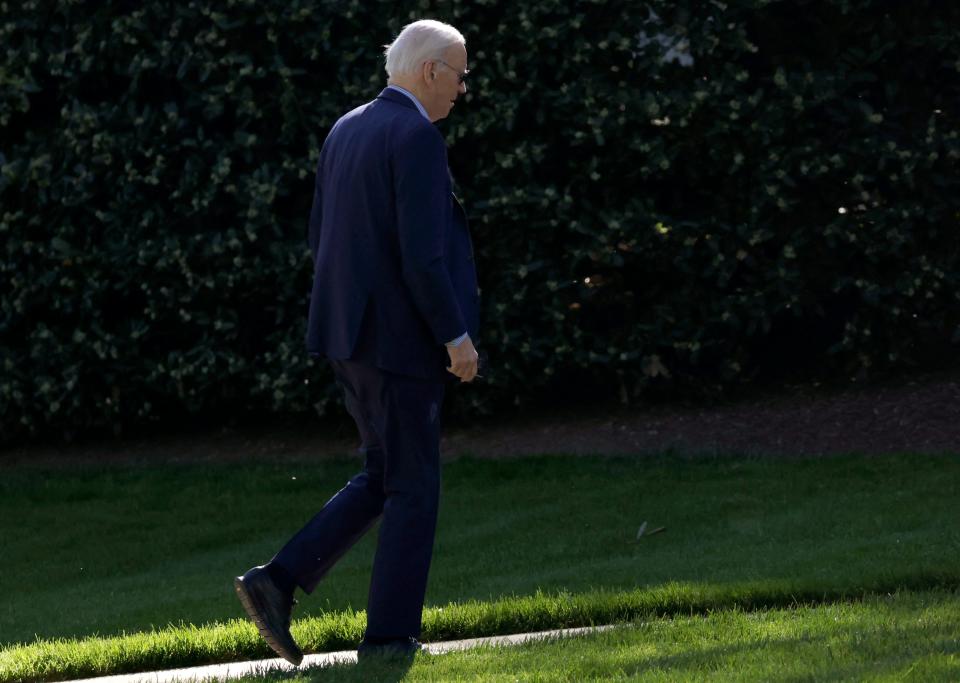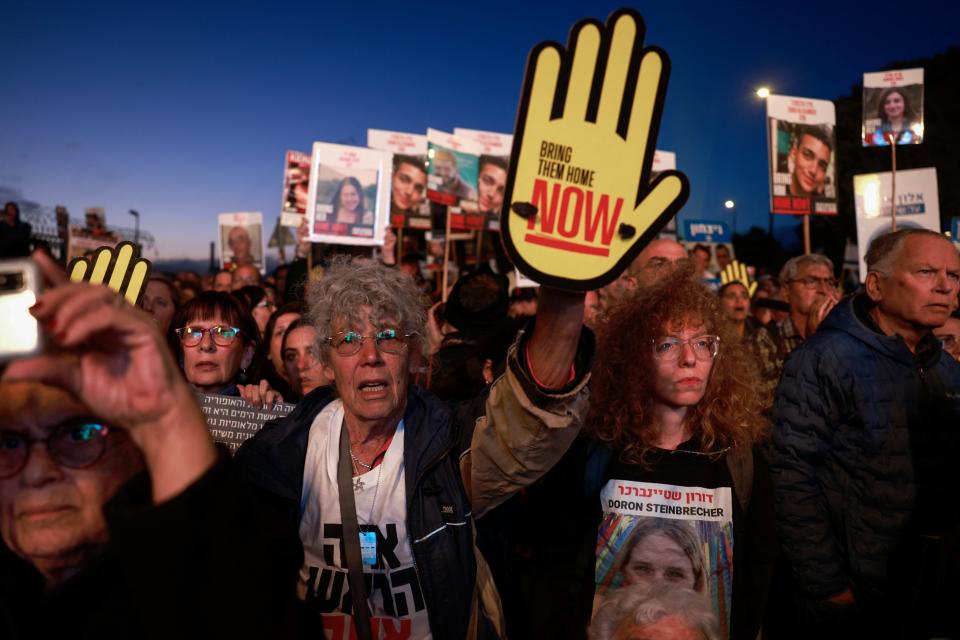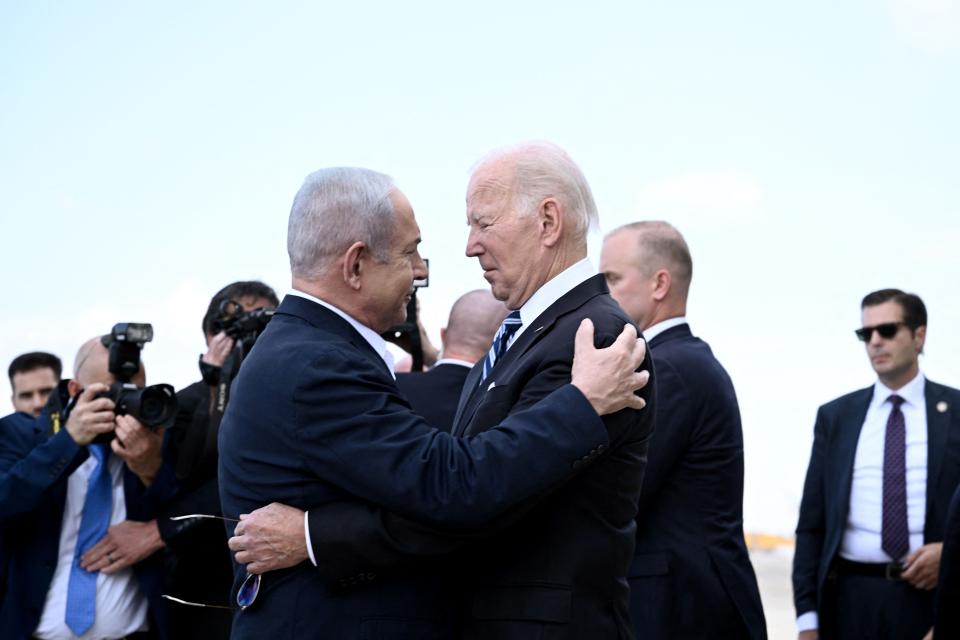Voters, fearful of World War III as Iran strikes Israel, will weigh foreign policy in 2024
Americans yet again had foreign affairs take over their TVs and cell phone screens after Iran launched a historic – and telegraphed – attack against Israel during the ongoing war in the Gaza Strip.
The U.S. helped repel a wave of 300 drones and missiles, but Iran’s direct action has raised the country's blood pressure as President Joe Biden and a divided Congress look to respond without further escalating the Gaza Strip crisis amid other international conflicts.
Voters, activists and foreign policy experts who spoke with USA TODAY said the nation becoming entangled in a larger global conflict is a source of concern.
However, some also asserted the risk of greater international tension isn’t at the forefront of what’s on their minds as the 2024 election comes into focus. Their views square with a country that spent years trying to extract itself from the post-9/11 Iraq and Afghanistan wars and a Donald Trump presidency centered around an "America First" platform that embraced a more isolationist foreign policy.
Chance Barrett, a systems engineer in Orlando, said the weekend attack in the Middle East will indirectly be an issue for him given the likelihood of U.S. lawmakers reviving an aid package to assist Israel and other allies.
"We're going to send billions of dollars that all of a sudden we have when people are not going to the doctor because it's super expensive; rent is ridiculous; inflation has come out to be just corporate greed and wages are stagnating," the 30-year-old registered Democrat said in an interview.
"It's like, man, you know, we got money for the wars but not for the poors."
Pamela Clark , a registered independent from Smyrna, Tennessee, said as a Christian she puts trust into God.
"I just don't think that American lives should have to police everybody," she said.
The 63-year-old retired saleswoman, however, does worry about the U.S. getting too involved overseas and how that could impact younger people, such as her grandson, who are still military age. She said foreign affairs aren't high on her list of issues. But Saturday's attack does make her think about who should be president.
"Biden is more objective than Trump is, and what I mean objective as I think he would be more diplomatic, not do anything rash," Clark said.
Those who favor the former president, however, said they believe the presumptive Republican nominee's unpredictability should be seen as an asset that deters rival world leaders and also terrorists.
“I mean, it kind of sounds cocky, but I don't think anybody's to that point of wanting to mess with America like that again, like they did back in the 1940s,” Landon Wadkins, a field engineer, from Mansfield, Louisiana, told USA TODAY.
The 37-year-old registered Republican said what's happening in other countries could always backfire, but that the U.S. would "squash a bug" if World War III occurred.
If these international wars turn into a referendum on the 2024 election, Wadkins said he believes that will favor Trump, who he said is better suited to deal with foreign affairs.
“It comes with that cocky American attitude," he said. "I know for majority of time it's not needed but for times like that (Trump) would be the guy that goes in and says, 'No, y'all need to stop it.' And I feel like people will listen to him in that regard."
Most Americans think another world war likely

Poll after poll asking voters what matters most to them in this year's presidential contest rank foreign affairs low, if at all.
A Gallup survey last month found most Americans saying topics such as inflation, crime, illegal immigration and affordable health care are among the most important problems facing the country. Nothing about what's happening in other nations made the list.
Todd Belt, a professor and political management program director at George Washington University in Washington, D.C., said voters rarely put foreign affairs at the top of their list unless too much U.S. "blood and treasure" is at stake.
"This seems to be an issue that may not be particularly important because American voters tend to have a short memory when it comes to foreign policy when they vote in November," he said.
Yet there are anxieties, as many rushed to social media to express worry about "World War III" in the aftermath of Iran's strike.
A YouGov survey released in March found 61% of Americans believe another world war is either very or somewhat likely to happen within the next five to 10 years. And events beyond U.S. borders have a way of upending past presidential races.
The global COVID-19 pandemic brought a virus to U.S. shores that changed everything, including how Democrats and Republicans campaigned for office and then how millions participated in the 2020 election.
Russia's meddling in the 2016 race, which included hacking American political party emails and misinformation aimed at voters, rankled that entire campaign; then President Barack Obama's reelection was tested in the fall of 2012 by the attacks on the U.S. consulate in Benghazi, Libya; and back all the way up to the 1980 presidential campaign, many historians assert how Iran capturing 53 American hostages left President Jimmy Carter in a bind for an entire year that helped buoy Ronald Reagan to the White House.
"The longer that we're involved in a foreign entanglement, the more of an effect it has," Belt said. "Shorter conflicts generally help a sitting president, especially in terms of reelection. Longer conflicts can be more detrimental."
The ongoing strife stemming from Israel's war with Hamas in the Gaza Strip presents Biden with more challenges, particularly from the voluble activist left which has waged militant protests calling out the rising death toll.

An exclusive USA TODAY/Suffolk University poll released in March showed a growing sympathy to Palestinians, especially among Democrats. About 69% of voters in Biden's own party said they wanted him to do more to hold Israel accountable for improving humanitarian conditions in the Gaza Strip.
As USA TODAY reported earlier this month, prominent donors on his finance committee have said they are withholding support until the Biden administration pressures Israel to change how it is conducting the war.
"For Biden this has been a real difficult issue, especially with regard to Israel because the Democratic Party has split on it in a way that the party is not split on something like Ukraine," Belt said.
Gordon Sondland, a former ambassador to the European Union, said Saturday’s attack reveals how much of a "paper tiger" Iran has become.
“I have never seen an attack of this magnitude that was so transparent and so telegraphed,” he said. “It was almost as if the mullahs in Tehran said we have to hit you back in order to save face with our hardliners.”
Sondland, who served under Trump, said the U.S. is “stretched thin” at the moment with helping Ukraine in its war against Russia and the potential turbulence with China focusing in on Taiwan. But rather than raising anxieties about a sprawling global war, the U.S. must soberly meet this moment by standing up to Iran.
“We were not close to World War III, but what this should tell the average person is you have to stand up to a bully and you have to stand up to a bully not by being reactive," he said.
U.S., Israel alliance is tested

As Congress renews a debate on a dual aid package for Israel and Ukraine, which Trump has expressed skepticism over, the debate over who is best suited to handle these crises continues in the rest of the country.
Eric Fingerhut, president and CEO of the Jewish Federations of North America, said Saturday’s attack is a reminder of how indispensable the U.S. and other allies are when it comes to protecting Israel and its people.
“The well-coordinated responses and the initiative taken… you can’t imagine the gratitude those of us who love and care deeply about Israel, who have family and friends there, feel right now,” he said.
Fingerhut, a former Ohio legislator whose organization represents 146 Jewish federations across the U.S. and Canada, said he hopes those who have reservations about the Israeli war against Hamas and its impact in Gaza, would be reminded that the conflict began after Hamas’ brutal attacks that killed about 1,200 Israeli civilians on Oct. 7.
“There has been concern that because of length and difficulty of Israel’s war to defeat Hamas, some were losing sight of what caused the war in the first place,” he said.

Other Jewish leaders echoed how Biden did a good job in warning the public of the potential for an Iranian attack and helping repel the drones and missiles. Still, this past weekend’s strikes revived uncomfortable memories.
“On one level, it seems like the global community was prepared,” Tyler Gregory, CEO of the Jewish Community Relations Council of the Bay Area, told USA TODAY.
“But on the other, it felt like Oct. 7. There was a lot of anxiety and fear playing out, and for all of us who have loved ones there it was a very scary weekend that reminded us of the uncertainty of six months ago,” he added.
The attack, he said, escalates the conflict and raises the potential for a miscalculation that could lead to global crisis. He compared it to the assassination of Austrian Archduke Franz Ferdinand, which sparked World War I in 1914.
“If someone makes a wrong move, this tinderbox could go up into flames immediately,” Gregory said. “That’s why a lot of us are on edge. We can’t be certain where this is going.”
Assal Rad, a Middle East historian and author of “The State of Resistance: Politics, Culture and Identity in Modern Iran,” said the attack this past weekend hints at longtime fears among analysts that Israel’s failure to heed international law and norms might escalate into something more serious.
“That’s one reason people have been calling for a ceasefire,” she said. “Not only for Palestinians and Gaza, but because of the fear that it could cause greater conflict. Now, we’re really at the precipice. And as an American, I’m very scared.”
Biden and Trump, she said, represent two failed foreign policy views that have already been on display for voters to gauge.
But Rad said even a third-party candidate, like American philosopher Cornel West, whose approach to domestic and foreign policy resonate with many progressives, has little chance in the current electoral system.
In Arizona, Paul Rockower, executive director of the Jewish Community Relations Council of Greater Phoenix, said many in his part of the country were “understandably anxious” about the situation.
Both Rockower and Gregory said Jewish Americans will cast their November ballots based on a number of issues, such as supporting democratic norms, LGBTQ issues, reproductive rights and resisting domestic extremism.
At the same time, Gregory said, while Jewish people are part of the Democratic Party backbone, that vote should not be taken for granted this fall.
"If Israel is abandoned, that’s going to be detrimental to the Democratic Party," he said.
This article originally appeared on USA TODAY: World War 3 fears loom for voters in 2024 amid Iran-Israel clashes


